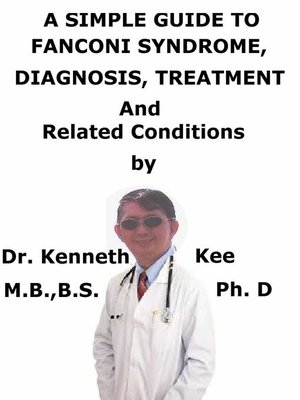Fanconi Syndrome, a Simple Guide to the Condition, Diagnosis, Treatment and Related Conditions
ebook
By Kenneth Kee

Sign up to save your library
With an OverDrive account, you can save your favorite libraries for at-a-glance information about availability. Find out more about OverDrive accounts.
Find this title in Libby, the library reading app by OverDrive.



Search for a digital library with this title
Title found at these libraries:
| Loading... |
Fanconi syndrome is a medical disorder of the tubes of the kidney in which some substances normally re-absorbed into the bloodstream by the kidneys are excreted into the urine instead.
Fanconi syndrome indicates the generalized poor function of the kidney's proximal tubules, not the other nephron segments
Fanconi syndrome results in:
1. Aminoaciduria,
2. Glycosuria,
3. Phosphaturia,
4. Renal tubular acidosis (RTA) type 2 (proximal),
5. Hypophosphatemic rickets (children) or osteomalacia (adults),
6. Renal glycosuria
It may be inherited or acquired:
Inherited
1. Primary idiopathic:
a. Sporadic or familial (autosomal dominant - chromosome 15).
This occurs in the absence of any identifiable reason, and most cases are sporadic.
Some cases are genetic, but the mode of inheritance appears to be variable (autosomal-dominant, autosomal-recessive, X-linked).
2. Secondary:
a. Cystinosis, tyrosinaemia,
b. Wilson's disease,
c. Lowe's syndrome (oculo-cerebro-renal syndrome: bilateral congenital cataracts, glaucoma, general hypotonia, hyporeflexia, severe learning disability and Fanconi syndrome),
d. Galactosemia,
e. Fructose intolerance,
f. Glycogen storage disorders and
g. Mitochondrial cytopathies.
Acquired
1. Intrinsic renal disease:
a. Acute tubular necrosis,
b. Interstitial nephritis,
c. Hypokalemic nephropathy,
d. Myeloma,
e. Amyloidosis,
f. Sjogren's syndrome,
g. Rejected transplant.
2. Hyperparathyroidism.
3. Drugs - e.g., cisplatin, ifosfamide, sodium valproate, tenofovir, aminoglycoside antibiotics and deferasirox
4. Toxins:
a. Glue sniffing,
b. Heavy metals,
c. Bee stings
Causes
Fanconi syndrome can be caused by faulty genes or it may occur later in life due to kidney damage.
Fanconi syndrome is caused by many predominantly rare causes.
The most frequent causes of Fanconi syndrome in children are genetic defects that entail the body's capability to break down some substances such as:
1. Cystine (cystinosis)
2. Fructose (fructose intolerance)
3. Galactose (galactosemia)
4. Glycogen (glycogen storage disease)
Other causes in children are:
1. Exposure to heavy metals such as lead, mercury, or cadmium
2. Lowe syndrome,
3. Wilson disease
In adults, Fanconi syndrome can be caused by a range of things that damage the kidneys, such as:
1. Certain medicines, such as azathioprine, cidofovir, gentamicin, and tetracycline
2. Kidney transplant
3. Light chain deposition disease
4. Multiple myeloma
5. Primary amyloidosis
Symptoms
1. Polyuria, polydipsia, dehydration
2. Bone deformities
Diagnosis
The diagnosis is based on too much loss of substances in the urine (e.g., amino acids, glucose, phosphate, bicarbonate) in the absence of high plasma concentrations
Further tests are needed to identify the cause.
1. Proteinuria: normally, only in small amounts.
2. Hypo-kalemia, hypo-phosphatemia and hyper-chloremic metabolic acidosis
Further tests and a physical examination may show signs of:
1. Dehydration due to excess urination
2. Growth failure
3. Osteomalacia
4. Rickets
5. Type 2 renal tubular acidosis
Treatment
Treatment mainly comprises of the replacement of substances lost in the urine and specific treatment for the underlying cause.
Treatments of the underlying cause are:
1. Alkali and potassium for RTA (renal tubular acidosis), phosphate and calcitriol for phosphate wasting.
2. Dehydration due to...






